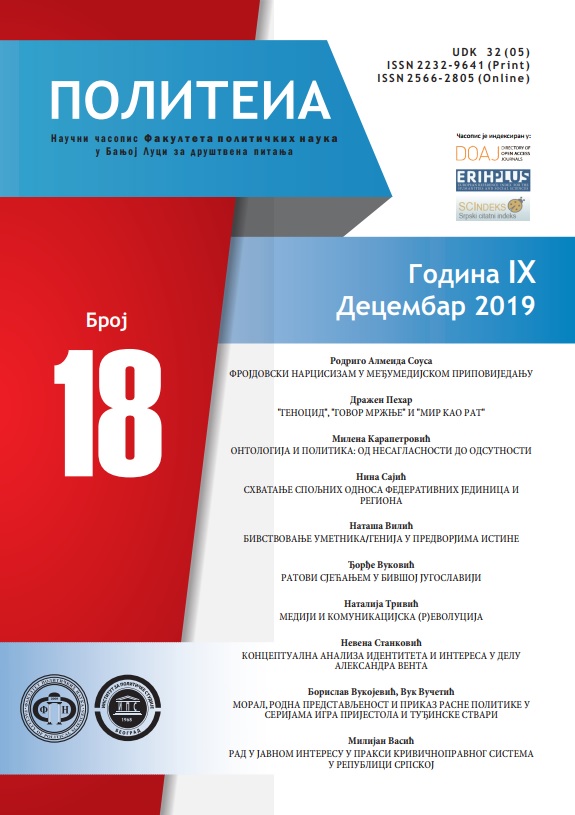THE CONCEPTUAL ANALYSIS OF IDENTITIES AND INTERESTS IN THE THOUGHT OF ALEXANDER WENDT
Abstract
Social constructivism is usually seen as a theoretical approach that made a sociological turn in the International Relations theories, by questioning what used to be perceived as de facto truths in dominant traditional theories. In the focus of this article is the concept of identities and interests of one of the most influential theorists of constructivism, who undoubtedly inspired further theoretical debate, Alexander Wendt.
However, the aim of this article is not to review, but to conceptually analyse Wendt’s theoretical approaches. By analysing definitions of identities Wendt offers, by understanding the process of their formation (endogenous and exogenous factors), their classification (personal/corporative, identity of type, identity of role and collective identity), as well as by understanding a relation between identities and interests (complementarily explanatory role), the author attempts to highlight the theoretical contribution and potentially highly significant practical implications of Wendt’s approach, primarily to analysis of states, their interests, behaviour and, potentially, prediction about their further international relations.
Furthermore, certain flaws are observed, reflected, primarily, in the existence of different, and even contradicted claims, as well as in excessive exclusivity, which are presented in an argumentative manner. Finally, the author concludes with suggestions in order to overcome the aforementioned flaws or, to some extent, to revise Wendt’s concept of identities and interests.
References
Behnke, A. (2006). Grand Theory in the age of its impossibility. In: Guzzini, S. & Leander, A. (eds), Constructivism and International Relations (pp. 48–56). London and New York: Routledge.
Kovačević, B. (2016). Što je to novo u konstruktivizmu? U: Jović, D. (ur.), Konstruktivističke teorije međunarodnih odnosa (str. 37–88). Zagreb: Fakultet političkih znanosti.
Kovačević, M., Vujinović, N. (2014). Socijalni konstruktivizam I međunarodni odnosi. Godišnjak FPN, 8 (1), 147–151.
Kratochwil, F. (2006). Constructing a New Ortodoxy?. In: Guzzini, S. & Leander, A. (eds), Constructivism and International Relations (pp. 21–47). London and New York: Routledge.
Lipovac, M. (2013). Doprinos konstruktivističke paradigme studijama bezbednosti. Sociološki pregled, 47(3), 439–460.
Luša, Đ. (2016). Sport, politika i diplomacija: analiza iz konstruktivističke perspektive. U: Jović, D. (ur.), Konstruktivističke teorije međunarodnih odnosa (str. 229–282). Zagreb: Fakultet političkih znanosti.
Popović, P. (2016). Društveni konstruktivizam i struktura međunarodnog sustava. U: Jović, D. (ur.), Konstruktivističke teorije međunarodnih odnosa (str. 89–110). Zagreb: Fakultet političkih znanosti.
Raos, M. (2016). Umjereni konstruktivizam Alexandera Wendta. U: Jović, D. (ur.), Konstruktivističke teorije međunarodnih odnosa (str. 111–146). Zagreb: Fakultet političkih znanosti.
Sárváry, K. (2016). No place for politics?. In: Guzzini, S. & Leander, A. (eds), Constructivism and International Relations (pp. 158–177). London and New York: Routledge.
Simić, R. D., Živojinović, D. (2016). Konstruktivistička teorija i koncept nacionalnog interesa. U: Jović, D. (ur.), Konstruktivističke teorije međunarodnih odnosa (str. 177–198). Zagreb: Fakultet političkih znanosti.
Suganami, H. (2006). Wendt, IR, and Philosophy. In: Guzzini, S. & Leander, A. (eds), Constructivism and International Relations (pp. 57–72). London and New York: Routledge.
Vent, A. (2014). Društvena teorija međunarodne politike. Beograd: Fakultet političkih nauka.
Wendt, A. (1992). Anarchy is What States Make of It: The Social Construction of Power Politics. International Organization, 46, 383–425. URL: http://www.jstor.org/stable/2706858
Wendt, A. (1994). Collective Identity Formation and the International State. The American Political Science Review, 88 (2): 384–396. URL: http://www.jstor.org/stable/2944711.
Wendt, A. (1999). Social Theory of International Politics. Cambridge: Cambridge University Press.
Zehfuss, M. (2002). Constructivism in International Relations: The Politics of Reality. Cambridge: Cambridge University Press.
Zehfuss, M. (2006). Constructivism and identity: a dangerous liaison. In: Guzzini, S. & Leander, A. (eds), Constructivism and International Relations (pp. 92–116). London and New York: Routledge.
Copyright (c) 2019 Politeia

This work is licensed under a Creative Commons Attribution 4.0 International License.
Autori koji objavljuju u ovom časopisu pristaju na sljedeće uslove:
- Autori zadržavaju autorska prava i pružaju časopisu pravo prvog objavljivanja rada i licenciraju ga "Creative Commons Attribution licencom" koja omogućava drugima da dijele rad, uz uslov navođenja autorstva i izvornog objavljivanja u ovom časopisu.
- Autori mogu izraditi zasebne, ugovorne aranžmane za neekskluzivnu distribuciju članka objavljenog u časopisu (npr. postavljanje u institucionalni repozitorijum ili objavljivanje u knjizi), uz navođenje da je članak izvorno objavljen u ovom časopisu.
- Autorima je dozvoljeno i podstiču se da postave objavljeni članak onlajn (npr. u institucionalni repozitorijum ili na svoju internet stranicu) prije ili tokom postupka prijave rukopisa, s obzirom da takav postupak može voditi produktivnoj razmjeni ideja i ranijoj i većoj citiranosti objavljenog članka (Vidi Efekti otvorenog pristupa).

